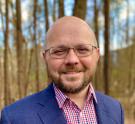
James Allen Nealy, Jr.
Postdoctoral Fellow at the Weatherhead Initiative on Global History at Harvard University (2023-24)
When did you first develop an interest in Slavic, East European, and Eurasian Studies?
I was fascinated by maps when I was a child. The Soviet Union was so huge that maybe it was inevitable that an interest in maps would lead to an interest in that state. How could a place be so enormous? Why was this place so enormous? So, one of my teachers helped me to write a letter to the Soviet Ambassador to the United Nations; I remember that we wrote something vague like: “Will you tell me about your country?” A few weeks later, I received a package full of magazines, books, and newspapers. I have been fascinated by all things Soviet ever since. I suppose I am evidence that great teachers can change lives and send people in any number of wonderful and unpredictable directions.
What support have you received throughout your career that has allowed you to advance your scholarship?
I have been fortunate enough to receive funding from several institutions. My dissertation research was funded by a Fulbright-Hays DDRA fellowship and the American Councils Advanced Research Scholars Program. The ASEEES Cohen-Tucker Dissertation Completion Fellowship gave me a chance to focus on writing for an entire academic year. The Kennan Institute and the National Council for Eurasian and East European Research have generously supported research and writing since I graduated in May 2022.
What is your current research project?
As a Postdoctoral Fellow at the Weatherhead Initiative on Global History at Harvard University, during the academic year 2023-2024 I’ll be working primarily on two major projects.
First, I am turning my dissertation, “Making Socialism Work!: The Shchekino Method and the Drive to Modernize Soviet Industry,” into a monograph. The manuscript examines Soviet efforts to improve social and economic conditions during the late twentieth century. It does so to understand Soviet socialism’s capacity to evolve. “Making Socialism Work” is, at once, a social history of work, an economic history of a factory, and an intellectual history of social science and policy making. At its core, the work is comparative. Though labor history long ago took a “global turn,” the Soviet Union has been left entirely out of these discussions. This is due in large part to an enduring vision that the Soviet economy “stagnated” in its early twentieth century form. In this literature, Soviet socialism represents the stubborn, unchanging “other” of an intrinsically dynamic Western capitalism. “Making Socialism Work” takes aim at these tropes to show how Soviet economic management and labor organization evolved in a way that resembled, but did not duplicate, changes in the capitalist world.
Second, I am co-editing, along with Emily Elliott, a volume on Soviet labor history that seeks to place the history of Soviet labor into conversation with that of the rest of the world. The collection of contributors we have put together is superb; I am fascinated by all of their topics, and I feel very lucky to have the opportunity to work with them to present their articles to the field. The volume is under contract with Lexington Books.
What do you value about your ASEEES membership? How has your involvement with ASEEES helped to further your career?
ASEEES has been instrumental to my career growth. I always learn so much from the annual convention – either from feedback I receive when presenting my own ideas or attending other panels. The conventions are also a great place to catch up with people I wish I could see more often and to meet really smart people who are doing good work. As I mentioned, the dissertation completion fellowship was an immense help. Winning the 2023 Tucker-Cohen Dissertation Prize is also very meaningful: it is very gratifying to have your ideas publicly supported by a committee of your peers; the prize will also make it possible for me to conduct research in the Baltics next summer.
While I have a chance, I also want to say that, in my opinion, ASEEES does a remarkable job with everything it handles: everyone is always so kind, professional, prepared, and helpful. It’s a great organization to be a part of.
Besides your professional work, what other interests and hobbies do you enjoy?
I enjoy hanging out with my wife and our dogs; watching baseball games and horror movies; and listening to heavy metal and Motown. Whenever I have a chance, I love to spend time in nature: I won’t pretend that I actually know what I’m doing, but I really like birdwatching, for example. I also desperately want to meet a capybara.